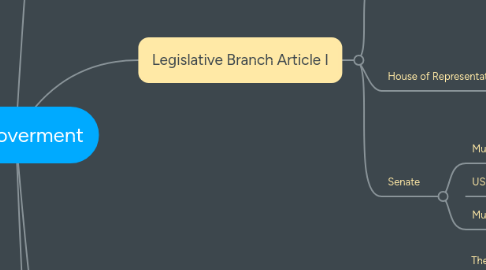
1. Executive Branch Article II
1.1. Powers
1.1.1. The power of the Executive Branch is vested in the President of the United States, who also acts as head of state and Commander-in-Chief of the armed forces.
1.2. Departments (15)
1.2.1. the Secretaries of Agriculture,
1.2.2. Commerce
1.2.3. Defense
1.2.4. Education
1.2.5. Energy
1.2.6. Health and Human Services
1.2.7. Homeland Security
1.2.8. Housing and Urban Development
1.2.9. Interior
1.2.10. Labor
1.2.11. State
1.2.12. Transportation
1.2.13. Treasury
1.2.14. Veterans Affairs
1.2.15. as well as the Attorney General
1.3. President
1.3.1. The President is responsible for implementing and enforcing the laws written by Congress and, to that end, appoints the heads of the federal agencies, including the Cabinet.
1.3.1.1. Qualifications
1.3.1.1.1. must be a natural born citizen of the United States
1.3.1.1.2. a resident for 14 years
1.3.1.1.3. 35 years of age or older
1.4. Vice President
1.4.1. The Vice President is also part of the Executive Branch, ready to assume the Presidency should the need arise.
1.4.1.1. Qualifications
1.4.1.1.1. Must be a natural born US citizen
1.4.1.1.2. A resident for 14 years
1.4.1.1.3. 35 years of age or older
2. Judicial Branch Article III
2.1. Supreme court
2.1.1. Powers
2.1.1.1. judicial review, or the ability of the Court to declare a Legislative or Executive act in violation of the Constitution
2.1.2. Qualifications
2.1.2.1. Must be 30 years old or older
2.1.2.2. Appointed by the president
2.1.2.3. Approved by the senate
2.1.3. Membership
2.1.3.1. Must be chosen by the president and appoved by the senate
2.2. Justices
2.2.1. Members
2.2.1.1. There are 9 members
2.2.2. Title of the Head Justice
2.2.2.1. Attorney General
2.2.3. How long can they serve?
2.2.3.1. A lifetime or until retirement
3. Legislative Branch Article I
3.1. The powers
3.1.1. the legislative branch makes all laws, declares war, regulates interstate and foreign commerce and controls taxing and spending policies.
3.1.1.1. Implied powers
3.1.1.1.1. those powers that are “necessary and proper” for Congress to be able to fulfill its duties. The express powers, on the other hand, include Congress' abilities under the Constitution, such as the power to: Regulate interstate commerce. Declare war.
3.1.1.2. Elastic Clause
3.1.1.2.1. A clause within the United States Constitution that grants Congress the power to pass whatever laws are deemed “necessary and proper” to help Congress to carry out the enumerated powers.
3.1.1.3. Expressed powers
3.1.1.3.1. Expressed powers are those specifically named in the Constitution. They are sometimes called delegated powers or enumerated powers. Since the Framers envisioned the Congress as the most powerful branch, its powers are most clearly expressed in Article I
3.1.1.4. Enumerated powers
3.1.1.4.1. Congress may exercise the powers that the Constitution grants it, subject to the individual rights listed in the Bill of Rights.
3.2. House of Representatives
3.2.1. New Topic
3.2.2. 25 years old
3.2.3. Had been a citizen of the US for the past 7 years
3.2.3.1. 435 Representatives
3.2.3.1.1. 2 year terms
3.3. Senate
3.3.1. Must be 30 years old
3.3.2. US Citizen for the past 9 years
3.3.3. Must live in the state in which they are running for
3.3.3.1. 100 senates (2 for each state)
3.3.3.1.1. 6 year terms
